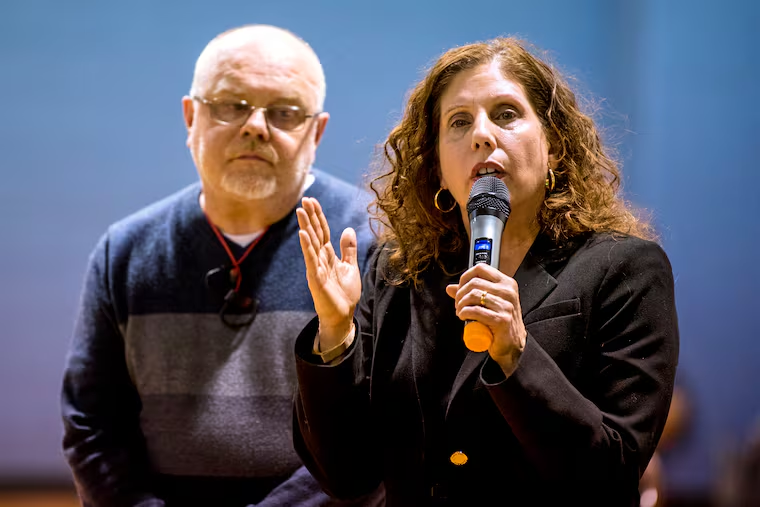Nonprofit behind Philly supervised injection site plan demands its day in court
The nonprofit’s lawyers reiterated their argument that supervised-injection sites are legitimate medical interventions designed to save lives.

The nonprofit formed to open a supervised injection site in Philadelphia is asking a judge to give it a chance to explain in court how such a facility can help stop fatal drug overdoses.
U.S. Attorney William M. McSwain sought an early ruling in the federal lawsuit he filed against the site, which would have denied Safehouse a full trial.
Supervised injection sites, where people can use drugs under medical supervision, be revived if they overdose, and access treatment, have been operating for decades in other countries. If Safehouse prevails in the lawsuit, Philadelphia could become the first city in the United States to have a site.
“We want an evidentiary hearing in which we can establish through the testimony of experts and others why [a site] is an appropriate medical procedure,” said Ronda Goldfein, Safehouse’s vice president and the executive director of the AIDS Law Project of Pennsylvania.
McSwain had asked that a judge rule simply on the arguments that have been filed in the case, forgoing a discovery period and a trial.
But Goldfein said Safehouse officials believe the court "needs to hear that medical professionals are trying to save lives every day by reversing overdoses.”
In a brief filed last month, McSwain said supervised injection sites violate a federal law colloquially known as the “crackhouse statute,” which makes the operation of a facility for drug use or sales a felony punishable by 20 years in federal prison.
He quoted former Gov. Ed Rendell, a Safehouse board member, who said at a Cato Institute symposium in March that he knew supervised injection sites “were against the law" when he was approached to join Safehouse’s board. McSwain said in an interview with The Inquirer that he believed Rendell had admitted the organization “had no case.”
Rendell added later in his speech that he believed the crackhouse statute was never meant to apply to supervised injection sites. After McSwain filed the brief, Rendell said that the U.S. Attorney had taken his words out of context, and that the “heart of his argument" for supervised injection sites is that prosecutors can use their discretion when choosing which cases to try.
In Safehouse’s brief, filed last week, lawyers for the nonprofit barely touched on McSwain’s use of Rendell’s quotes, repeating that they had been taken out of context.
“Those statements are outside the scope of the pleadings and irrelevant to the issues pending before the court,” lawyers wrote in a footnote. “Gov. Rendell’s concern that there is potential criminal exposure for Safehouse is not surprising, in light of the [Department of Justice’s] widely publicized (and misguided) interpretation” of the crackhouse statute.
The nonprofit’s lawyers reiterated their argument that supervised injection sites are legitimate medical interventions designed to save lives amid an overdose crisis that has claimed more than 3,000 lives in Philadelphia in three years. Its lawyers argued that the crackhouse statute, a 1986 law co-sponsored by then-U.S. Sen. Joe Biden, doesn’t apply to supervised injection sites because such a site’s purpose is not simply to allow drug use, but to save lives by reversing overdoses.
“Safehouse’s public-health approach to overdose prevention is plainly far removed from the conduct that Congress targeted when it enacted — and subsequently amended — Section 856, namely, ‘crack houses’ and rave parties,” the filing read.
And though McSwain called the nonprofit’s argument that its officials’ religious beliefs are driving them to open a supervised injection site “half-hearted,” Safehouse lawyers said the organization’s board “sincerely believes” that their religious beliefs compel them to save lives in an overdose crisis.
Safehouse has rearranged its leadership team; court filings from May show that Jeanette Bowles, who was originally hired as the nonprofit’s executive director, stepped down in April and is no longer listed on the lawsuit.
Though Safehouse was offered a commercial building rent-free on Hilton Street in Kensington — the neighborhood that sees more overdoses than anywhere else in the city — it has not signed a lease. Last month, a bill was introduced by City Councilman Mark Squilla, who represents portions of Kensington, that would rezone the entire block of Hilton Street for residential use only. (The city Planning Commission opposes the rezoning, saying that the proposed use for the site was in line with other “medical services” in the area.) The bill was passed but has not yet been signed by the mayor.
Squilla said at a Council rules committee hearing that he was bringing the property’s zoning in line with that of Jasper Street, which abuts Hilton. But he has acknowledged that the rezoning means that any future zoning changes at the Hilton Street property could not proceed without a community hearing. He added in an interview that he was not sure whether rezoning a property could block a supervised injection site from opening there, because there’s nothing in city regulations or zoning code to allow or restrict a supervised injection site.
“We remapped it to fit into the spirit of the community,” he said. “We felt that it was something that was necessary to also give the community input in case a use would be put into that location that would try to supersede the community’s involvement. Both reasons were good enough" to rezone.
Goldfein, who is married to an Inquirer editor, David Lee Preston, said Safehouse is still searching for a site. “When you look at the map, the overdoses are there [in Kensington], and you can’t walk away from the epicenter of the overdoses. That doesn’t mean there’s not more than one appropriate site.”